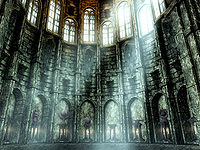Lore:Divines

- "Yet the wicked and foolish are not doomed, for in their infinite mercies, the Nine have said, "Repent, and do Good Works, and the Fountains of Grace shall once more spill forth upon you." — The Ten Commands of the Nine Divines
The Divines are the Aedric deities which make up the official pantheon of the Cyrodilic Empire, and thus have been worshiped all across Tamriel. Their membership was defined by Saint Alessia at the founding of the First Empire in the aftermath of the rebellion she led. Her now-emancipated people had long ago adopted the Aldmeri religion of their Ayleid captors, but the rebellion had only been won with the aid of armies from Skyrim, who adhered to the Nordic pantheon. Alessia could not force either group to adopt the religion of the other, for fear of starting another war which would tear apart the newborn Empire. Instead, she developed an elegant synthesis of both traditions, combining common archetypes (mother goddess, god of death, etc.) and avoiding drastic changes. This new pantheon was the Eight Divines, commonly called simply the Eight:
-
- Akatosh, the Dragon God of Time
- Chief among the gods, with mastery over the flow of time. Associated with dragons and the qualities of endurance and virtuous service.
- Arkay, the Mortals' God
- God of cycles, particularly that of birth and death. Presides over funerals and burial rites, as well as ushering in the changes of the seasons.
- Dibella
- Goddess of beauty and art, and one of the most popular of the Divines. Widespread cults are dedicated to both healing and sexual instruction.
- Julianos
- God of logic, wisdom, and the arts of magic. His temples act as educational institutions in literature, history, and law.
- Kynareth
- Goddess of the heavens, winds, and rain. Patron of sailors and travelers, and often propitiated for good fortune in life.
- Mara, the Mother-Goddess
- Goddess of love, compassion, and the bounty of nature. Presides over marriage ceremonies, befitting her ancient origins as a fertility goddess.
- Stendarr, the Steadfast
- God of mercy, justice, and righteousness. Patron of all those who wield righteous might to protect the weak, from emperors to holy warriors.
- Zenithar, the Trader God
- God of work, commerce, and wealth, invoked for success in business ventures. Teaches prosperity through honest industry, rather than violence or deceit.
This pantheon would stand for thousands of years, until Tiber Septim's reunification of Tamriel and declaration of the Third Era. Upon his death, so great were his deeds that he achieved apotheosis and joined the ranks of the Divines. Known as Talos, the ascended emperor was accorded a lofty position among the gods, who now numbered the Nine Divines. He became the patron of the Empire and all its ideals of civilization, as well as those who go to war to defend it.
The Nine would watch over the Empire at its height under the Septim Dynasty, throughout the Third Era. But the Oblivion Crisis brought the Empire to its knees, and the reach and influence of the Imperial pantheon dwindled into the Fourth Era. It came to a head in 4E 171, when the Aldmeri Dominion demanded a stop to the worship of Talos in an ultimatum to Emperor Titus Mede II. He refused, sparking the Great War, which ended with the controversial White-Gold Concordat, banning Talos worship as one of its conditions. With this, Divines once again officially numbered Eight, and Thalmor agents were empowered throughout the Empire to stamp out worship of the deposed Talos. This proved to be a highly disruptive imposition on an already-fractured Empire, leading to widespread discontent and even a province-wide revolt.
Worship
As Aedric beings, the Divines gave greatly of themselves during the creation of Mundus, using their own energy to imbue the world with life and natural laws. This leaves them in a much reduced state, not able to interfere with mortal affairs as freely as the Daedra who maintain their full power in Oblivion. For this reason, the primary view of the Divines is as impersonal, generally benevolent spirits, worthy of propitiation but without any strong direct relationship. However, there are notable exceptions in the form of cults, which are particularly dedicated to the worship of a single Divine. The Imperial Cult reveres Talos, and is particularly influential among members of the military. An even more militant cult is the Vigil of Stendarr, paladins who fanatically hunt down Daedric creatures which threaten mankind. But Dibella claims the most widespread appeal, boasting dozens of cults dedicated to various aspects of beauty and aesthetics.
Since the Divines were based on existing local pantheons and common archetypes, in many areas the two co-exist. For instance, among the Nords of Skyrim, Kynareth has not entirely supplanted native Kyne as the goddess of nature. Generally, these alternatives are tolerated by Imperial authorities for pragmatic reasons, although proper worship of the Divines is always encouraged.
See Also
- The Talos Mistake de Leonora Venatus
Imperial Liaison to the Aldmeri Dominion — Propaganda encouraging acceptance of the ban on the worship of Talos - Ten Commands: Nine Divines — The Ten Commands of the Nine Divines
- Varieties of Faith... de Irmão Mikhael Karkuxor — Uma lista expansiva dos panteões e espíritos divinos associados das culturas dominantes de Tamriel.
- Reflections on Cult Worship de Cuseius Plecia — Comparisons between the Imperial Cult and the Temple